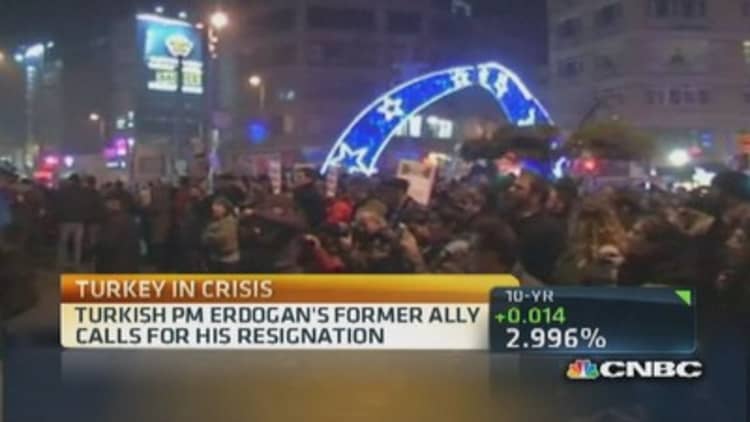The hit a two-year high against the dollar on Friday and, by the grace of geopolitics, investors can thank the Turkish lira for the spike.
The euro touched $1.3894 in morning trade, its highest level since November 2011. The currency is up 2 percent just this week.
Yet most strategists expect the dollar to gain against major currencies over the next year on the back of the Fed's decision to taper its bond-buying program.
So what does Turkey have to do with Europe's common currency peaking against an otherwise-strong dollar?
(Read more: Further gloom in store for lira)

The answer lies in the political unrest in Turkey, where a corruption scandal has rocked the country and created fresh instability in an economy that was already barely growing.
Three cabinet ministers were forced to resign this week after their children were arrested as part of a nationwide sweep of those suspected of graft.
Prime Minister Tayyip Erdogan responded to the graft probe by cracking down on the police, rather than the suspects. Street protests ensued, as did calls for the long-embattled Erdogan to step down.
The currency dropped to an all-time low of 2.14 per dollar on Thursday as Erdogan fired ten ministers and appointed loyalists to those positions in a bid to secure his power.
"We remain bearish on Turkish assets, as (we) still think the political tensions could get worse before they get better," Brown Brothers Harriman currency strategists said in a note.
The scandal has fueled anti-government sentiment that has been brewing since mass street protests swept Istanbul and other Turkish cities earlier this year.
Against that backdrop, investors have been fleeing the lira for safe havens like the euro.
"The EUR jumped sharply versus a variety of currencies, likely driven by additional capital flow out of Turkey and a comment by ECB Board Member/Bundesbank President Jens Weidmann that too-low interest rates could endanger political reforms in Europe," Pierpoint Securities' Robert Sinche wrote in a note Friday.
The uncertainty is a clear contributor to the euro's rise, others noted, as assets flee the country. (By way of comparison, more than $1.3 billion in capital fled the country in late May and early June amid unrest at that time, the country's central bank said).
"Even if there are occasional lulls, political volatility in Turkey is set to continue into the New Year with on-going negative implications for the economy," Eurasia Group's Naz Masraff wrote in a note.
"An escalation of the power struggle within the state's institutions, including the police and the judiciary, will further undermine the country's rule of law and have a negative impact on market sentiment."
—CNBC Asia's Katie Holliday and Reuters contributed to this report.



